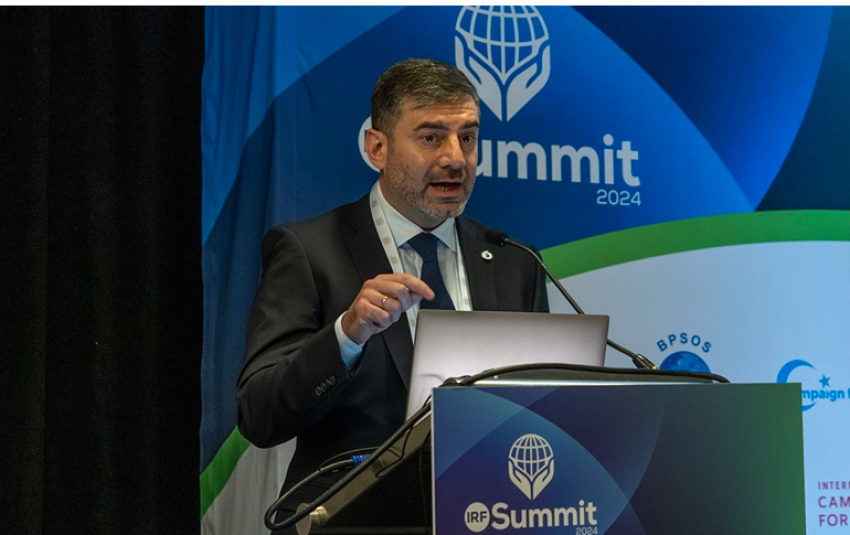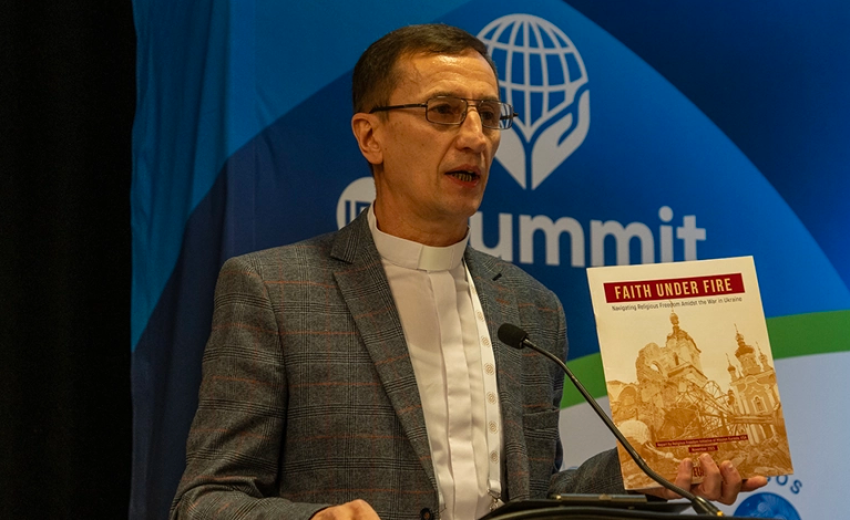Russian forces captured, killed at least 29 religious leaders since Ukraine war began: official

Russian soldiers and occupation officials have committed at least 76 acts of religious persecution in Ukraine since the invasion of February 2022 as part of an attempt to destroy national identity, official and church sources said at the International Religious Freedom Summit.
Since the invasion, Evangelical Christians, including Baptists, Pentecostals and Seventh-day Adventists, have suffered greatly, Parliament Commissioner for Human Rights in Ukraine Dmytro Lubinets told participants at the summit, taking place in Washington, D.C., Tuesday and Wednesday.
“The Russian military has repeatedly threatened the total physical elimination of all Evangelical believers, calling them American spies, sectarians and enemies of the Russian Orthodox people,” Lubinets said at a panel discussion on Tuesday. “To kill a person, to demolish a church, the Russians do everything to destroy us as a nation.”
Citing the 76 cases of persecution since the invasion, Lubinets said Russian soldiers and officials have killed or captured at least 29 clerics or religious leaders in Ukraine since February 2022, adding that this figure represents only the verified cases, and the actual number is much higher.
Along with arbitrary detentions, rape, torture and threats of murder, he said, “the occupiers simulate shootings, threaten to execute family members. These people are detained in inhumane conditions, without water or food, even without access to a toilet.”
Mykhailo Brytsyn, a pastor in Ukraine until Russian soldiers broke into a worship service and closed down his church, said all churches in cities occupied by Russia are closed.

“Most priests and pastors like me have been threatened, intimidated, humiliated, detained, beaten and deported,” Pastor Brytsyn told summit participants. “Some priests and believers are still in Russian prisons today. Some of them were killed.”
Lubinets said one of the first things Russian soldiers do when they capture a city is destroy church buildings, “except for only one, and they also force all citizens to go to it.”
In November 2022, a deacon of an Evangelical church and his son were found shot to death in a forest area of the Russian-occupied part of Kherson Region a few days after they had been kidnapped by Russian soldiers, he said.
“In August 2023, the Russians attacked the Roman Catholic parish of Skadovs’k in the Kherson Region,” Lubinets added. “Parishioners were told that it was a special counter-terrorist operation. There are many such stories.”
Since February 2022, Russia has damaged or destroyed more than 600 religious buildings, including those of Protestant, Jewish, Catholic and Muslim communities, he said.
“The largest number of destroyed religious buildings is in the temporarily occupied territories of Donetsk and Luhansk regions,” Lubinets said.
A November report by the Religious Freedom Initiative of Mission Eurasia, USA, found that the invasion resulted in damage to at least 630 religious structures, including 206 Evangelical houses of prayer.
Among the ideological bases for Russian attacks on religious targets is the goal of destroying a Ukrainian culture that now takes pride in freedom of religion and democratic values, the report states.
After the Russian-backed separatist movement erupted in 2014, “Ukrainian religious figures and most religious communities in Donetsk and Luhansk Regions controlled by Russia suffered brutal persecution,” the report states. “The only exception was the Ukrainian Orthodox Church, affiliated with the Moscow Patriarchate, which enjoyed immunity as it supported the Russian-controlled separatists.”
Russian occupation officials perceived members of the Orthodox Church of Ukraine, the Ukrainian Greek-Catholic Church and Evangelical churches as enemy agents and spies from Ukrainian or American intelligence services, the report states. By February-March 2022, Russian soldiers were primed to persecute religious adherents.
“Russian propagandists began to accuse Ukrainian religious figures of organizing armed resistance,” the report states. “Priests and pastors were baselessly accused of cooperating with the Security Service of Ukraine, storing weapons, transporting explosives, or calling for an armed uprising against the occupation authorities.”
Viktor Zelenskyi, head of State Service of Ukraine for Ethnic Affairs and Freedom of Conscience to the Council of Ministers, told participants of the IRF Summit that the Russian invasion of Ukraine brought atrocities such as the shooting of priests, pastors, imams and their wives.
“When I asked pastors who were persecuted in Kyiv Region during the two-month occupation of Kyiv territory why Russian soldiers were so angry and so brutal toward religious sites, one said, ‘They hate freedom, and they really hate liberties — they cannot survive when people can freely pray,’” Zelenskyi said.
The Russian Orthodox Church and its Patriarch Kirill are not only tools of the Russian aggression but participants, he said.
“Patriarch Kirill not only blessed militaries against Ukraine, he openly said he would like to destroy Ukrainian identity, he would like to destroy Ukrainian culture, Ukrainian language, and he would like to wash away all scenes of guerrillas and militaries, [that they] be killed in Ukraine during the so-called special military operation,” Zelenskyi said. “I completely realized and do believe that Patriarch Kirill is one of the highest criminals who are guilty for [the deaths of] martyrs, who is guilty of all these violations of human rights and religious freedom in Ukraine.”
Pastor Brytsyn, who is director of the Religious Freedom Initiative of Mission Eurasia, told summit participants that as long as the Russian occupation of Ukrainian territories continues, new cases of religious persecution will appear.
“Where there is Russia, there is no freedom at all,” he said. “I believe that religious freedom will return to the occupied territories only when they are liberated and returned under control of Ukrainian government."
This article was originally published by Christian Daily International.
Christian Daily International provides biblical, factual and personal news, stories and perspectives from every region, focusing on religious freedom, holistic mission and other issues relevant for the global Church today.



























